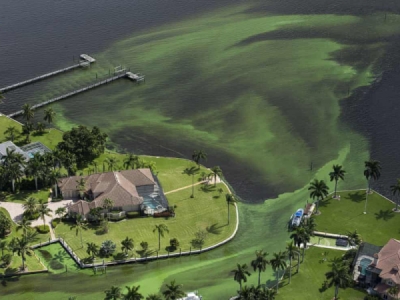
Posted on June 2, 2019
Tom Frazer plans to make water quality a priority in new role created by Republican governor Ron DeSantis
To say Dr Tom Frazer faces a daunting workload as he begins his new job as Florida’s first chief science officer would be an underestimation. From the increasing risk of ever stronger Atlantic hurricanes, toxic algae blooms that have inundated the state’s beaches and inland waterways, and rising sea levels that threaten to leave Florida underwater by the end of the century, the challenges appear immense.
But where many see a five-alarm climate emergency laying siege to his state, Frazer, with a measured approach honed from more than three decades’ experience of working in environmental science, sees only opportunity.
“It’s a very exciting time in the state of Florida,” he said in an interview with the Guardian and several local reporters as he assumed the role created by the new Republican governor, Ron DeSantis, soon after he took office in January.
“There’s a clear focus in this state right now on water quality issues, so that is my priority moving forward. Rising sea levels are [also] a priority issue and factor prominently in how we’re looking at some of the other issues we’re dealing with. I don’t know how to say it any clearer than that.”
While Frazer and his new boss, Noah Valenstein, Florida’s secretary for environmental protection, were reluctant to characterize it as such, the appointment of a chief science officer – the first such state-level position in the nation – is a literal sea change from the approach taken by DeSantis’s predecessor, Rick Scott.
As governor, Scott was widely seen as a disaster for the environment, slashing $700m from the water management budget, rolling back crucial water quality safeguards and pursuing pro-industry policies that critics said turned a blind eye to pollution and polluters. Florida’s recent tourism and wildlife-killing red tides, they insist, were far worse as a result.
Scott was also credited with banning the phrases climate change and global warming from the official state lexicon, something he repeatedly denied during his ultimately successful run for a US Senate seat in November.
Frazer, who most recently served as director of the University of Florida’s school of natural resources and environment, believes his appointment can help steer the state back on course.
One of his main roles will be to provide lawmakers and others who help shape state policies with accurate, up-to-date scientific facts and considerations.
“There is a lot of information out there and it’s distributed widely throughout the state,” he said. “It’s important to harness that information, simplify it, provide it to individuals responsible for making policy and carrying out management actions, so in that regard science is intended to really inform those policy decisions.”
In the coming weeks Frazer will begin working with a newly convened taskforce to investigate the devastating naturally occurring green-blue algae blooms in Lake Okeechobee and inland waterways that many environmentalists believe were worsened by nutrient run-off from sugar and other farming industries.
“The taskforce will try to better understand the causes of these blooms throughout the state and how we can contain them, what technology, for example, we can bring to bear on dealing with them,” Frazer said.
There is, however, no bigger pressing issue in Florida than global heating, which science has linked to higher sea levels and more powerful hurricanes, such as last October’s Hurricane Michael, the first category 5 storm to strike the state since 1992.
Some experts even predict a complete collapse of Florida’s economy: Spencer Glendon, a fellow at Woods Hole research center, said he thought it was “insane” for anybody to own or lend on property in Florida.
Such dire warnings have prompted municipalities to act. Miami Beach, the city of Miami and Miami-Dade county all have their own resilience officers and billions of dollars have been spent on flood prevention, improved drainage and raising roadways. But until now there has been no cohesive statewide approach.
Valenstein says DeSantis’s new, “science first” approach is intended to change that.
“The idea of having the first chief resilience officer is clear recognition of the importance of dealing with sea level rise and resiliency issues throughout Florida,” he said.
He pointed to other moves DeSantis has made, including renaming the state department of environmental protection’s coastal division the office of resilience and coastal protection, and pledging $2.5bnfor the environment over four years.
Frazer, meanwhile, said he intended using his experience to tackle Florida’s environmental challenges across the board, and on an issue-by-issue basis. “I’ve worked in springs, coastal rivers, estuary and marine environments, offshore, coral reef work down in the Florida Keys,” he said. “[I] hope to bring that experience to bear on the many issues we’re facing.”
Source: coastalnewstoday.com





